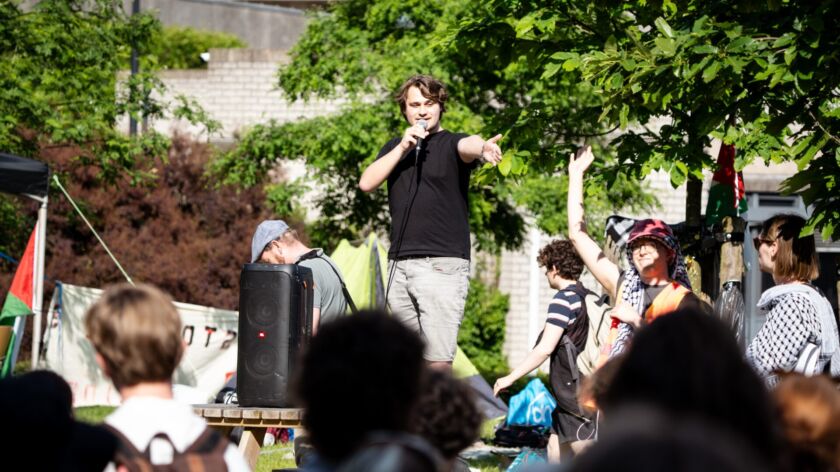The Young Academy: ‘Protest serves as a form of education’
-
 Woordvoerder Ties van Nijmegen for Palestine brengt verslag uit van de onderhandelingen met het college. Foto: Johannes Fiebig
Woordvoerder Ties van Nijmegen for Palestine brengt verslag uit van de onderhandelingen met het college. Foto: Johannes Fiebig
Campus demonstrations are permitted only under specific conditions, as outlined in a special directive issued by universities. According to The Young Academy, however, curtailing the right to protest in this manner risks stifling debate.
On its website, The Young Academy, an association of leading scientists affiliated with the Royal Netherlands Academy of Arts and Sciences (KNAW), criticises the directive for demonstrations that university boards have unilaterally announced. They argue that the directive risks having “a chilling effect”, making people afraid to speak out.
‘If students are required to provide advance notice of any demonstration and ensure that others do not commit any criminal acts, for example, they may feel anxious about the repercussions of their involvement’, says Eddie Brummelman, president of The Young Academy and associate professor of pedagogics at the University of Amsterdam. ‘Reasonable voices can be lost as a result.’
Furthermore, according to the statement, the directive issued by university boards “contradicts” the spirit of universities, which should be places of public reason, discussion and debate. The Young Academy believes they need to reconsider how they view demonstrations.
This is backed up by the belief that demonstrations can provide learnings: ‘Protest, including civil disobedience, serves as a form of public teaching and learning, compelling all involved (including management) to engage with one another’s perspectives and arguments.’
Barricades
This raises a number of questions. The recent wave of demonstrations began at the University of Amsterdam, where barricades were erected and damage and destruction were caused. Could that be described as a form of education and, if so, were the actions of the riot police also a form of education?
Of course, the association denounces violence, says Brummelman. That is not at issue here, he believes. He prefers not to get into a broad discussion about what is and is not allowed during demonstrations: ‘That’s not up to us. Specific circumstances vary, and that’s exactly why we can’t establish universal guidelines.’
‘While the directive may seem well-intentioned, we contend that it has harmful consequences’
Above all, he stresses that safeguarding the right to demonstrate should always be prioritised, in consultation with the university community. University management should therefore exercise restraint in calling police to campus to end peaceful protests, according to the statement.
It is a thin line. It seems that university administrators are now swift to summon the police, yet Brummelman does not give specific examples. Police action is not entirely taboo: The Young Academy agrees that the police may intervene when damage or destruction occurs or to protect public health.
‘Us-versus-them’ mentalities
The criticism is directed primarily at the repressive aspect of the directive. ‘While the directive may seem well-intentioned and sound reasonable, we contend that it has harmful consequences’, says Brummelman.
He argues that it undermines universities as places of public reason and exacerbates divisive ‘us-versus-them’ mentalities. ‘Management pits itself against staff and students, while universities belong to us all. We have a joint responsibility.’
He also cites the ban on mask wearing at protests as an example. ‘When students or staff openly participate in protests, they may be concerned about how they will be assessed in their studies or in their workplace. They may become afraid to voice their opinions at those times.’
A follow-up question could be whether you should also be allowed to participate in open debates on sensitive issues while concealing your identity. Concrete moves in that direction are avoided, with The Young Academy being reluctant to formulate its own guidelines.
‘Restricting and impeding protests can also jeopardise social safety’
The response on The Young Academy’s website reads: “[Universities’] institutional purpose is precisely to act as public spaces and laboratories of ideas, carving out room for debate and reasoned disagreement. Especially on controversial and contentious issues such as the ongoing war in Gaza.” According to the academics, protests fall under the same principle, and any unnecessary intervention should be avoided as far as possible.
Social safety
Can protest clash with social safety? Brummelman: ‘That’s possible, of course, but restricting and impeding protests can also jeopardise social safety. Above all, we hope that together we can foster a positive environment where we can actively seek to understand each other’s perspectives.’
And are activists allowed to occupy buildings? That is not for The Young Academy to decide. ‘Peaceful demonstration is, in principle, allowed although the right to protest is not absolute’, says Brummelman.
Ultimately, what is the difference between the views of The Young Academy and university management? ‘Universities impose restrictions, while The Young Academy encourages universities to engage with students and staff on how to facilitate peaceful protests’, says Brummelman.
Translation: Taalcentrum-VU



